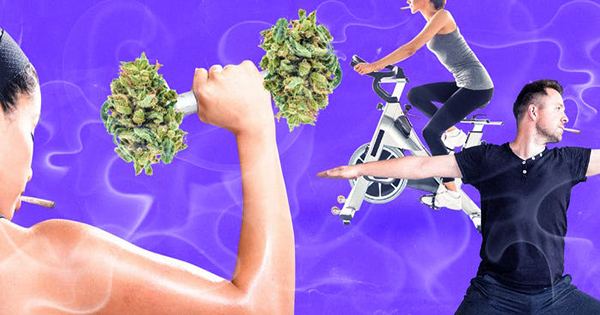Although it may not seem like the most rational idea to get stoned before visiting the gym, a number of recent polls have indicated that many individuals prefer to work out while high. Improved attention, better enjoyment, and faster recovery are among the claimed advantages; however, there are no big studies on the issue, so it is difficult to tell for sure how smoking pot affects exercise. What we can tell for sure is that combining cannabis with exercise equipment should avoid at all costs. Many studies have shown that getting drunk decreases coordination and decision-making while simultaneously increasing reaction times, therefore lifting big weights when inebriated is extremely risky.
Furthermore, research has shown that cannabis has an effect on the cardiovascular system, such as dilation of blood vessels and an increase in heart rate. While these side effects are normally innocuous, they might cause issues for those with cardiac problems, especially when cannabis is combined with exercise. However, it looks that getting stoned while getting in shape is becoming more fashionable. In a poll of over 600 people in jurisdictions where recreational cannabis is legal, 81.7 percent said they would use cannabis while exercising, with young males being particularly appreciative of the combo.
“The majority of participants who favored using cannabis soon before or after exercise claimed that it improves their pleasure of and recovery from exercise, and about half said that it boosts their motivation to exercise,” the researchers concluded. They also discovered that people who exercised while stoned put in more minutes of aerobic and anaerobic training per week than those who do not use cannabis at the gym. Another recent poll of 231 online respondents indicated that 45 percent of those who smoked marijuana before working out did so for psychological reasons; while only 14 percent said it gave them a physical boost. 36% of those who like to light up after the gym claimed it helped them heal psychologically, and 28 percent said it helped them recover physically.
While observational studies like these are intriguing, a lack of rigorous trials makes it hard to determine whether cannabis benefits exercise and, if so, by what mechanisms. Cannabinoids like CBD and THC, on the other hand, may help with recovery after exercise because of their capacity to lower inflammation and pain, but such a notion needs thoroughly investigate before any definite conclusions could form.
The endocannabinoid system has also been linked to the generation of happy emotions following exercise, a phenomenon known as “runner’s high.” For decades, experts have debated whether endorphins or the body’s own cannabinoids are responsible for this impact, albeit research released earlier this year strongly suggests the latter.
Blocking endorphin receptors in the brain did not prevent participants from feeling high after exercise, and jogging for 45 minutes resulted in an increase in endocannabinoids in blood plasma, according to the researchers. Increased synthesis of the body’s own cannabinoids is linked to improved mood and reduced anxiety, suggesting that these substances may play a key role in mediating the psychological effects of exercise. One would be tempted to conclude that plant-based cannabinoids such as THC have comparable effects and that becoming stoned could therefore aid to improve a workout. Such an assumption, however, should not consider as true until more study has been done on the subject.
















